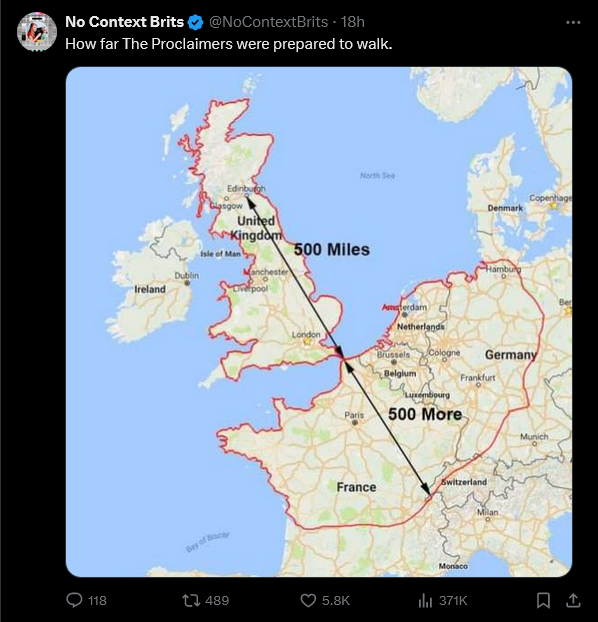Fun with maps
-
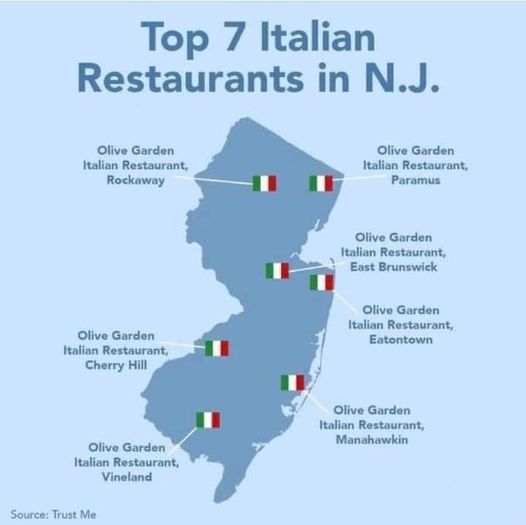
-
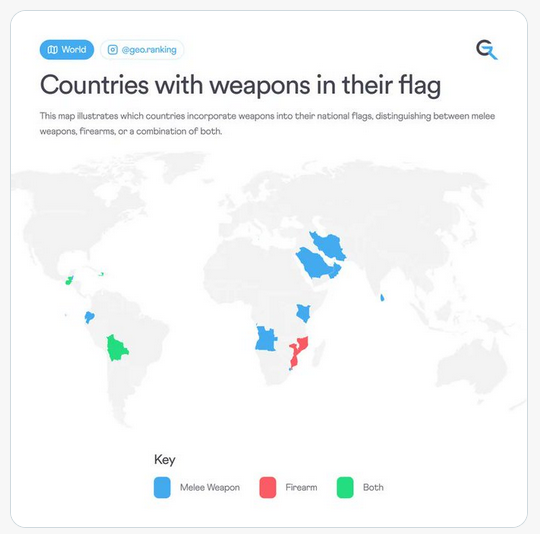
-
@Arantor More literally:
-
@Arantor said in Fun with maps:

I don't see no weapon in Bolivia's …
 … apparently Bolivia has a civil flag, that is just red, yellow and green stripe, and a state flag, which additionally has the coat of arms on it. TIL.
… apparently Bolivia has a civil flag, that is just red, yellow and green stripe, and a state flag, which additionally has the coat of arms on it. TIL.
-
@Bulb Surely a maple leaf can be used as a weapon, no?
-
@da-Doctah said in Fun with maps:
@Bulb Surely a maple leaf can be used as a weapon, no?
Only in its native climate. Once it unfreezes, it's safe to encounter.
-
@Gurth That's the other way round, countries that incorporate flags into their weapons.
HTH, HAND
-
@ixvedeusi said in Fun with maps:
@Gurth That's the other way round, countries that incorporate flags into their weapons.
It’s a weapon in a flag, though. (Granted, I only posted that one because I couldn’t quickly find a photo of a weapon wrapped in a cloth flag.)
-
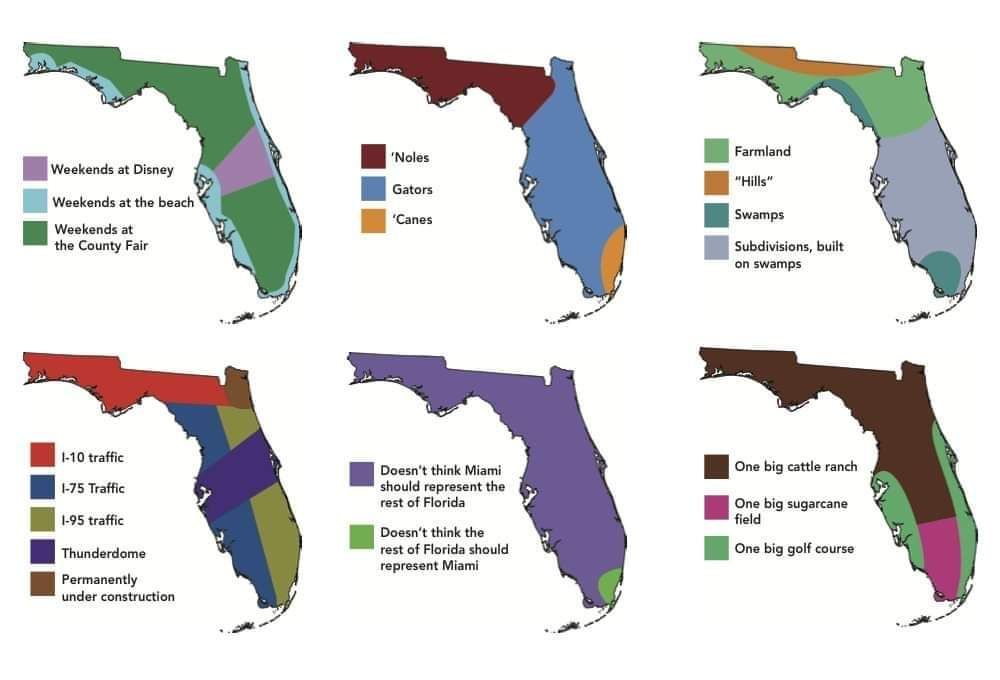
-
-
@loopback0 And then they'd been in Edinburgh/Geneva (Cross out what is not appropriate). Why would they do that to themselves?
-
@PleegWatsaid in Fun with maps:@loopback0 And then they'd been in Edinburgh/Geneva (Cross out what is not appropriate). Why would they do that to themselves?
HTH, HAND

-
@PleegWat said in Fun with maps:
@loopback0 And then they'd been in Edinburgh/Geneva (Cross out what is not appropriate). Why would they do that to themselves?
To lay down at your door, of course.
-

-
@Zerosquare One problem I spot there: Iceland. Few or very few people will have Jónsdóttir as an actual last name there. Iceland is also somehow coloured blue for the name “signifying patronage” instead of red for “Patronymic, matronymic, or ancestral” when you can’t get more patronymic than names like this.
-
@Zerosquare Another flaw: the title of the map says "last name", but it seems they ignored that in those places where the family name comes first (Japan, Hungary, etc).
-
@Zerosquare It would also be better if they unified the male and female forms where they differ, though it wouldn't probably change the results, because the male and female form should be similarly common for each.
-
@Bulb Where applicable, it would not give them a penalty compared to last names which do not have gendered forms.
-
Also Garcia apparently means something in Andorra but not in Spain.

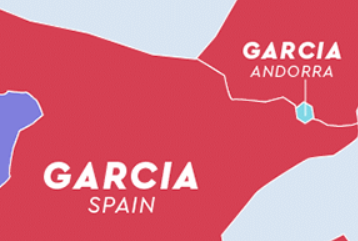
Still, an interesting/amusing map.

-
I want to see one of those old war movies where the squadron commander calls his men: "Schmidt! Herrera! Kovacs! Get in here on the double!"
-
@Zerosquare It's actually kinda funny that a female surname is the most common one on Iceland, considering that the last bunch of decades men outnumber women there.
-
@Carnage Could be just a case of Jón being the most common men’s name in Iceland, and that by some fluke, men called Jón on average have more daughters than sons. Even if there’s only one more Jónsdóttir than Jónsson, it makes Jónsdóttir the name to appear on this map.
-
@Bulb said in Fun with maps:
@Zerosquare It would also be better if they unified the male and female forms where they differ, though it wouldn't probably change the results, because the male and female form should be similarly common for each.
 The correct terms for grammar gender are "masculine" and "feminine" ; words are not "male" or "female" (the people identified by the words might be, but that is not really the issue here).
The correct terms for grammar gender are "masculine" and "feminine" ; words are not "male" or "female" (the people identified by the words might be, but that is not really the issue here).
-
@Kamil-Podlesak said in Fun with maps:
but that is not really the issue here
 it is. As I understand it, the surnames in e. g. Iceland depend on the person's gender. The sons of a guy called Jón will be called Jónsson, his daughers Jónsdóttir. I don't think names even have a grammatical gender?
it is. As I understand it, the surnames in e. g. Iceland depend on the person's gender. The sons of a guy called Jón will be called Jónsson, his daughers Jónsdóttir. I don't think names even have a grammatical gender?
-
@ixvedeusi said in Fun with maps:
I don't think names even have a grammatical gender?
In most Slavic languages they do. Well, most of them, because surnames derived from nouns use a feminine suffix (e.g. ‘-ová’ in Czech or ‘-a’ in Russian), surnames derived from adjectives use the masculine or feminine forms (because adjectives have all three gender forms to match the subject they apply to) and surnames derived from adverbs are inflexible and don't have separate forms.
I still used ‘male’ and ‘female’ because it is governed by the gender of the persons referred to rather than pure grammar.
-
Another mislabeled country would be Israel, which technically should be labeled "Occupational", since Cohen is the Hebrew word for priest. Though in Judaism being a priest was hereditary, "Cohen" was not the given name of a person.
-
@ixvedeusi said in Fun with maps:
I have perfect confidence that someone will correct me if I'm wrong
Doesn’t look like you did, except for calling them “surnames” which implies a family name. Something like 90% of people from Iceland don’t have that at all; IIRC the ones that do are all descended from immigrants, who get to keep their family names when they become Icelandic citizens.
Not really related to the above at all, but Iceland apparently also issues passports on request in which the father’s “surname” appears for all members of a family, to avoid foreign immigration officials thinking that they might be dealing with kidnappers or something (“Man called Jónsson, woman called Porsdóttir, a supposed child of theirs called Bjørnsson …? Time to call in reinforcements.”)
-
@Gurth I am now remembered of the case of Prawo Jazdy, the scofflaw who racked up traffic violations in Ireland with over fifty different addresses, until someone finally realized that traffic cops were copying the Polish words for "driver's license" onto the citations.
-
@Gurth said in Fun with maps:
Not really related to the above at all, but Iceland apparently also issues passports on request in which the father’s “surname” appears for all members of a family, to avoid foreign immigration officials thinking that they might be dealing with kidnappers or something (“Man called Jónsson, woman called Porsdóttir, a supposed child of theirs called Bjørnsson …? Time to call in reinforcements.”)
Or just refuse to give shared room in hotels for pairs that are obviously not married (due to not having the same surname).
Used to be actually quite common and especially in Switzerland there were reportedly very strict about that and applied this rule even for people with gendered surnames - even if the difference is literarily just a single letter (like in Russian).
-
@Dragnslcr said in Fun with maps:
Another mislabeled country would be Israel, which technically should be labeled "Occupational", since Cohen is the Hebrew word for priest. Though in Judaism being a priest was hereditary, "Cohen" was not the given name of a person.
Oh, those colors are all over the place. Even for one single name: Russia, Belarus and Bulgaria have the same most common name, but it's marked red for Russia and Blue for the others.

Also "Muhammad" is apparently an ancestor of most middle-easter families, patron of central asian ones and an occupation on Maledives (is that a
 joke or something?).
joke or something?).
-
@da-Doctah said in Fun with maps:
@Gurth I am now remembered of the case of Prawo Jazdy, the scofflaw who racked up traffic violations in Ireland with over fifty different addresses, until someone finally realized that traffic cops were copying the Polish words for "driver's license" onto the citations.
People used to names like "Meadhbh", "Caoilfhionn" or "Tadhg" will faithfully copy any string of printable characters no questions asked.
-
@Dragnslcr said in Fun with maps:
Another mislabeled country would be Israel, which technically should be labeled "Occupational"
That thread is




-
@LaoC said in Fun with maps:
@da-Doctah said in Fun with maps:
@Gurth I am now remembered of the case of Prawo Jazdy, the scofflaw who racked up traffic violations in Ireland with over fifty different addresses, until someone finally realized that traffic cops were copying the Polish words for "driver's license" onto the citations.
People used to names like "Meadhbh", "Caoilfhionn" or "Tadhg" will faithfully copy any string of printable characters no questions asked.
For bonus points how we are pronouncing those?
-
@Arantor said in Fun with maps:
People used to names like "Meadhbh", "Caoilfhionn" or "Tadhg" will faithfully copy any string of printable characters no questions asked.
For bonus points how we are pronouncing those?
Meadhbh: /miːjvʲ/
Caoilfhionn: /kiːlʲʊnʲ/
Tadhg: /bɔb/
-
@Gurth Who the eF created the orthography for Welsh‽
-
@Bulb said in Fun with maps:
@Gurth Who the eF created the orthography for Welsh‽
Largely William Salesbury and William Morgan, I gather. But if you mean to ask about those names, they’re Irish, not Welsh ;)
Trying to decipher those names got me thinking about Irish spelling the other day, and it gave me the thought that Irish has similarities to the Cherokee syllabary. The latter was invented by a man who had heard about writing and knew some Latin letters but not the sounds associated with them, so he basically invented a writing system from scratch. Whoever came up with Irish spelling must have been in a comparable situation, but have the added disadvantage of having the idea that using more letters makes words better.
-
@Gurth said in Fun with maps:
Whoever came up with Irish spelling must have been in a comparable situation, but have the added disadvantage of having the idea that using more letters makes words better
Sound like something the French would do
-
@Gurth said in Fun with maps:
But if you mean to ask about those names, they’re Irish, not Welsh
Sorry, I can't tell that, both languages have similarly weird spelling.
@Gurth said in Fun with maps:
Whoever came up with Irish spelling must have been in a comparable situation
That's kinda weird, this was outskirts of the medieval Europe and everybody who'd learn to read and write would almost certainly also learn some liturgy in Latin to associate some sounds to the letters, though sounds quite different from what English used.
-
@Bulb said in Fun with maps:
@Gurth said in Fun with maps:
But if you mean to ask about those names, they’re Irish, not Welsh
Sorry, I can't tell that, both languages have similarly weird spelling.
Not at all! Welsh loves the
ffletter pairing, but notbhordhthat you see in Gaelic. Also, the letterswandyare more common.Gaelic is simple to recognise by the way it has far too many letters in use for the syllable-length if its words.
-
-
@Bulb said in Fun with maps:
@Gurth Who the eF created the orthography for
WelshIrish‽Saoirse Ó Séaghdha, oibdhbhsly.
-
@Bulb said in Fun with maps:
That's kinda weird, this was outskirts of the medieval Europe and everybody who'd learn to read and write would almost certainly also learn some liturgy in Latin to associate some sounds to the letters
That’s what I would expect too. But somehow, they seem to have gotten the idea that you need more letters than Latin to transcribe the same sounds … Irish words all seem to start out fairly normally (<n> for /n/, etc.), but by the time you get to the end, their spelling usually bears no relationship at all anymore to normal European pronunciation of the letters. It’s consistent in Irish, I guess, but WTF would you write things like <mh> for /v/? I can’t find any way in which /mh/ shifts to /v/ when trying to say them.
Welsh has a far more logical spelling. Sure, it has a few oddities, but every language does to some degree or other. Few come close to Irish, though, not even English.
though sounds quite different from what English used.
English has the problem that its modern spelling reflects vowel pronunciation of about 300–500 years ago — which is to say, from back when they pronounced vowels like the rest of Europe does. <a> being the /a/ and /ɑ/ sounds, <e> for /e/ or /ɛ/, etc. rather than <a> being /e/, <e> being /i/, and so on (except when they’re not).
-
@Gurth the Irish view is generally that “well if you will go applying English pronunciations to the letters, you deserve everything you get” because that’s really the problem here.
“mh” being a v sound is only weird because you’re used to seeing those letters and associating different sounds to them than what the Irish did long ago.
-
@Gurth said in Fun with maps:
English has the problem that its modern spelling reflects vowel pronunciation of about 300–500 years ago — which is to say, from back when they pronounced vowels like the rest of Europe does. <a> being the /a/ and /ɑ/ sounds, <e> for /e/ or /ɛ/, etc. rather than <a> being /e/, <e> being /i/, and so on (except when they’re not).
That happened to most languages with sufficiently long literary tradition to fix the spelling. It even happened to Greek during the classic period, which is how we got <ph> pronounced as /f/ – <φ> used to be pronounced /ph/ when Romans started transcribing Greek to their alphabet.
-
@Arantor said in Fun with maps:
“mh” being a v sound is only weird because
you’re used to seeing those letters and associating different sounds to them than what the Irish did long ago.most of the rest of Europe can more or less agree what sounds these letters stand for.Seriously, in this particular case even the English and the French mostly can, for %DEITY%'s sake! And to the best of my knowledge, so does Latin.
-
@Bulb said in Fun with maps:
rth Who the eF created the orthography for
WelshIrish‽Maybe it started as something like Volapuk encoding? As in, someone told them they had to use the Latin alphabet now, so they just tried to reconstruct their ancient runes or whatever with the shapes of those letters?

-
@Bulb said in Fun with maps:
It even happened to Greek during the classic period, which is how we got <ph> pronounced as /f/ – <φ> used to be pronounced /ph/ when Romans started transcribing Greek to their alphabet.
That's not the only pronunciation change in Greek, although many of them happened a bit later, in the Hellenistic period.
- β /b/ -> /v/ For a hard /b/ sound (in loanwords such as μπέιζμπολ (baseball), the μπ (mp) digraph is used.
- δ /d/ -> /ð/ (voiced th, as in the) To write a hard /d/ sound, the ντ (nt) digraph is used.
- ι,η,υ,ει,οι merged from /i/, (/h/->/ɛː/), (/u/->/y/), /ɛːi/, /oi/, respectively, to /i/ (Note that this does not apply to μπέιζμπολ. The tonos (accent) is over the ε, not the ι, so the vowels are pronounced individually, as if the ι was written ϊ.)
- ω,ο merged from /oː/, /o/ to /o/
- αυ /au/ -> /aβ/ or /aɸ/ depending on whether the following phoneme is voiced or unvoiced.
- ευ /εu/ -> /εβ/ or /εɸ/ depending on whether the following phoneme is voiced or unvoiced. (This is presumably the origin of the British pronunciation of words such as lieutenant as leftenant.)
- Probably one or two more that I don't remember offhand and/or don't have time to write right now.
-
@HardwareGeek Anyways, that's Greek to me.

-
@Arantor said in Fun with maps:
“mh” being a v sound is only weird because you’re used to seeing those letters and associating different sounds to them than what the Irish did long ago.
Well, yes — all spelling is essentially the assigning of arbitrary symbols to the sounds that people make. The problem with Irish is that they seem to have gone for entirely different (combinations of) symbols for many sounds than the rest of Europe that uses the same alphabet. Which would be understandable if there’s a shift in pronunciation but not in spelling, like with English vowels — but what I’m saying is that I don’t quite see how /mh/ or /mʰ/ would shift to /v/, given the very different ways in which those sounds are actually produced.
-
@Gurth said in Fun with maps:
but what I’m saying is that I don’t quite see how /mh/ or /mʰ/ would shift to /v/, given the very different ways in which those sounds are actually produced.
Presumably, whoever came up with Irish orthography was Irish. Therefore, the irrationality can be attributed to having been drunk as a skunk at the time.


